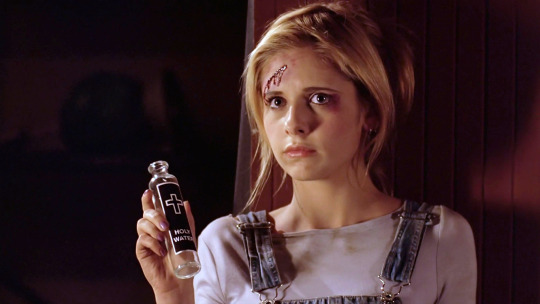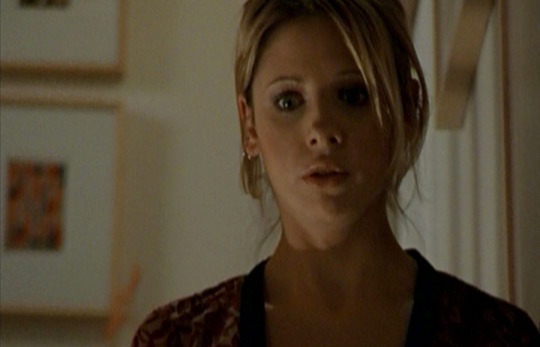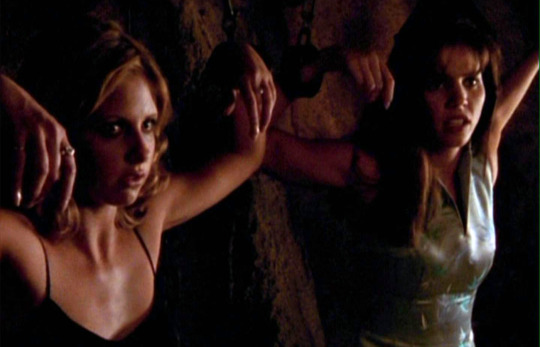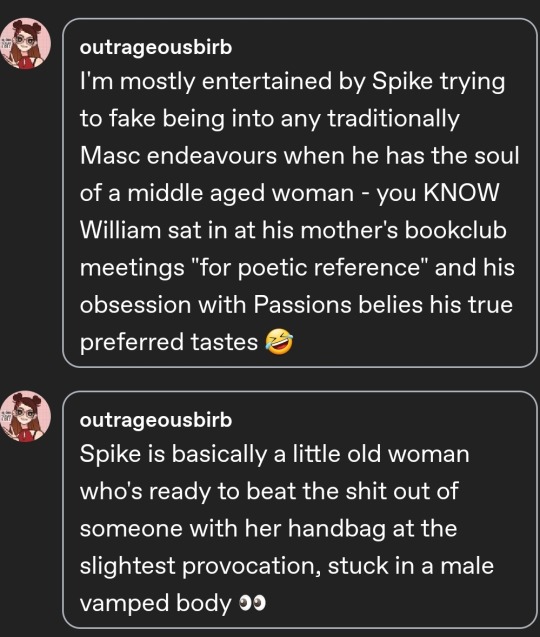#theme:patriarchy
Explore tagged Tumblr posts
Text
But You're Just A Girl (Helpless)

The test that Buffy undergoes in this episode – in which she is stripped of her powers, locked inside a house, and forced to fight a mentally unstable vampire – is named in the script as The Cruciamentum. Giles describes it as “an archaic exercise in cruelty”, and it’s difficult to think of a description that could be more accurate.
The word Cruciamentum is an invented declension that roughly translates from Latin as “result of torture”. Quentin Travers – making his first appearance here as the Head of the Watcher’s Council – defends the practice as a necessary rite of passage, meant to make a Slayer stronger, but this reasoning falls apart under scrutiny The scenario is so heavily weighted against the Slayer, robbing her not only of her powers but the knowledge that she is being robbed at all, that it makes more sense to view the Cruciamentum not as a test, but as a method of control, designed to kill off Slayers that reach adulthood and so gain more independence from the Council. At the very least, it demonstrates the Council’s control over the Slayer, holding the implicit threat of taking away her powers again over her head for the rest of her life. As is the case with many unjust systems, the cruelty is the point.
The Cruciamentum is the Council’s most clear and obvious cruelty, but it is not by any means their only one. Cruelty is their origin story, as we see in Get It Done how they forcibly created the first Slayer through metaphorical rape. It is baked into the central idea of One Girl In All The World – a system which relies on the deaths of an infinite chain of young women. Its current setup, with one Watcher in the field and apparently dozens sitting safely away in England, leads to an inevitable cruelty of indifference that Giles calls out in this episode. There are cruelties of incompetence – failing to alert the field about the firing of Gwendolyn Post, sending the underqualified Wesley to Sunnydale. But perhaps their most impactful cruelty is also their most subtle. It came the moment that Buffy Summers, sitting outside her school in 1997, was called to be a Slayer. This act not only changed Buffy’s life, but caused an irreparable crack in her psyche. It splits her perceived self into two component parts – The Girl and The Slayer – twin selves that she spends seven seasons trying to reconcile.
Read More
#buffy summers#rupert giles#btvs#buffy the vampire slayer#meta#btvs meta#essay#insect reflection#theme:girlslayer#theme:patriarchy#s3#helpless
338 notes
·
View notes
Text
You Don't Get It - You Killed A Man (Ted)

This episode opens with the gang lamenting how quiet the town has been since the apparent deaths of Spike and Drusilla, and Buffy enjoying her brief reprise from the trials of the supernatural. Of course, this is Buffy, so no reprise can last longer than an opening scene. Buffy arrives home to find the door unlatched and ajar, and hears a sound from the kitchen. Our genre-savvy senses tingle, as do Buffy’s, and we expect some horrible monster to be lurking in the kitchen, waiting to attack. Unfortunately, Buffy opens the door and finds it’s much worse than that. Her mother has a new boyfriend.
Read More
#btvs#buffy the vampire slayer#btvs meta#meta#essay#insect reflection#s2#ted#buffy summers#theme:shadow#theme:patriarchy
86 notes
·
View notes
Text
I Hate It When They Drown Me (Go Fish)

“Beautiful. Isn't it? Eternal. A true mother, giving birth to new life and devouring old. Always adaptable and nurturing... yet... constant... and merciless.” - Cameron Walker, 2x20 Go Fish, speaking about the ocean.
Vampires are creatures of eternal life - living forever and never ageing. They possess a dark beauty and allure to our main character - indeed the most prominent vampire in the story so far was apparently named for his beauty. He was named by his sire - his “mother”, as Drusilla might say. Vampires constantly birth new (un)life by feeding and siring other vampires. In most cases - such as with Darla and Angel, they will “nurture” and shape their progeny, guiding them to kill and hunt and survive.
They are ever adaptable - surviving on a planet whose sun will burst them into flames by hiding away in sewers and abandoned houses and other cracks and crevices of society. And yet, they are constant - unchanging, un-ageing, and unlike our protagonist, unable to grow up, unable to make choices, unable to change. But they are, above else, without mercy. Without a soul, mercy means nothing to them. It is not something they would ever offer, for it requires some level of empathy, kindness, and sacrifice.
The ocean… is vampires.
Read More
#buffy the vampire slayer#btvs#btvs meta#meta#essay#insect reflection#s2#go fish#buffy summers#xander harris#cordelia chase#theme:patriarchy#cw rape discussion
36 notes
·
View notes
Text
This Is Just My Outfit (Halloween)

Part 18 of the Insect Reflection, a series of essays covering every episode of Buffy the Vampire Slayer
“Do you love my insides? The parts you can’t see?”
Drusilla asks Spike this question early in the episode, and it lays out the theme pretty clearly. This is an episode about hidden selves, about duality. It’s about taking a look at the characters’ Inner Selves – the parts we can’t see – and comparing them to their outward presentations – the parts we can. We are invited to consider whether the Inner Self is something that should be loved and celebrated, or hidden away for the good of others. And we should compare that to the image that these characters present to the world – the costumes that they wear.
The costume, in this case, is the Outer Self – the version of ourselves we present to the world. This can be a reflection of the Inner Self, or a means to hide it – or somewhere in between. One of the most basic questions about humanity is which of these Selves is the “true” self? Are we what we do? Are we the person others see? Or are we what we are inside? These are questions far too big and esoteric for a Buffy the Vampire Slayer blog to answer, but Halloween does scratch at their surfaces in some interesting ways.
In two very specific ways, I think. First, through the idea of costumes as concealing a hidden sef, and secondly the idea of costume as gender performance. Two different ways of interacting with and expressing the Inner Self, and two lenses through which we will look at this episode.
Read More
#longest and I think maybe best one so far#btvs#buffy the vampire slayer#btvs meta#meta#essay#insect reflection#s2#halloween#buffy summers#xander harris#rupert giles#willow rosenberg#feminism#theme:patriarchy#theme:duality
98 notes
·
View notes
Text
Is This A Penis Metaphor? (Reptile Boy)

You know how it goes. Girl meets Boy. He’s older and more experienced - but seems nice, kind, thoughtful. Girl falls for Boy. They get close; maybe they sleep together. And then, when she wakes up, he’s changed. He’s cruel, mean, even evil. It turns out he just wanted to use her, and never really cared about her at all.
That is the basic story at the heart of season two. The grand, gothic, star-crossed love story of a redeemed sinner and an anointed hero, constructed around a simple story of a teen girl whose first boyfriend turns out to just be a real dick.
It’s also the story in this episode - the slightly less grand story of Buffy and Tom the Frat Guy.
Read More
#btvs#insect reflection#meta#essay#btvs meta#s2#reptile boy#buffy summers#cordelia chase#xander harris#angel#rupert giles#theme:patriarchy
43 notes
·
View notes
Text
All Men Are Beasts (The Pack)

This is the Insect Reflection - a series of essays looking at every episode of Buffy The Vampire Slayer.
*
The Pack starts off as a simple episode about bullying and social cliques. It shows us a group of bullies (never seen before and never to be seen again), and another newbie that they pick on – the nerdy and shy Lance. They get infected with a hyena spirit (as you do), and Xander joins in on their animal possession/bully clique. The eponymous Pack is a metaphor for social in-groups, the infection is a metaphor for how people can easily slip into bullying behaviour. It’s a pretty standard High School Buffy monster-as-metaphor episode. But behind that, this is also a story about gender, and a battle for dominance between three predators – Xander, the Hyena, and Buffy.
READ MORE
#btvs#buffy the vampire slayer#btvs meta#s1#the pack#xander harris#daniel oz osbourne#buffy summers#theme:patriarchy#insect reflection#essay#meta
47 notes
·
View notes
Text
Thanks for sharing your thoughts. Same back to you - not being confrontational, etc, I think this is a good discussion to have. But I firmly disagree.
I should clarify at the start that my issues are not with the idea of feminine/masculine traits (here in this post meaning "traits and interests traditionally and stereotypically aligned with femaleness/maleness") being outdated. I don't think that we as a society have actually evolved all that much in this area, and even if we had, I do believe in analysing Buffy as a product of late 90s/early 00s culture.
You are correct in saying that the show is stuffed full of gender commentary, and uses the idea of feminine/masculine traits in order to support that commentary. Buffy as a character concept is based off the simple gender subversion that you mention. She embodies a lot of masculine traits (physical strength, aggression, enjoyment of sex, emotional repression, leadership) and a lot of feminine traits (kindness, caretaking, interest in fashion, petite stature, forgiveness). All of these traits make up who Buffy is, both masculine and feminine, but they do not change this fact: Buffy is a woman.
There is a difficulty when it comes to the thorny area of gender/sexuality canons and headcanons for fictional characters. I have talked about this before in relation to how I interpret certain characters as gay or bisexual despite this not being explicitly specified in the text. When it comes to gender (and sexuality, but we're mainly talking about gender here) two things are true: 1) Gender is a complex and many-layered thing, and the only meaningful method of determining gender is through self-identification. 2) Fictional characters cannot self-identify, due to the fact that they do not exist, and do not have autonomy.
In order to resolve this contradiction, we must therefore interpret the information that the show provides us with, extrapolate it out, and draw a conclusion based upon that. We have to assign genders and sexualities to these fictional people. And if we are meaningfully engaging with the text and not just indulging in fanon/AUs (which is a valid way to engage with fandom, but it's not what we're talking about here) it must be based on what is present in the text - whether that be clear in-universe self-identification or accidentally implied subtext. I intepret Willow as a lesbian because she says she is a lesbian. I interpret Faith as a lesbian because she doesn't seem to actually enjoy sex with men and her only genuine romantic feelings appear to revolve around a woman. I interpret Giles as bisexual because he has romantic/sexual encounters with several women and also has an implied sexual history with a man. I interpret Anya as straight because she demonstrates sexual and romantic attraction to several men and to no women.
What fans need to be aware of is the difference between interpretating ambiguities in the show and just applying stereotypes. Somebody saying "I think Faith is bisexual because she seems to enjoy sex with Robin but also seems to be attracted to Buffy" is a fair inference given the text. Somebody saying "I think Faith is bisexual because she sleeps around and is very sexually assertive" would simply be applying a stereotype surrounding bisexual people. This is not insulting to Faith, who doesn't exist, but it is insulting to real bisexual people.
So bringing it back to Buffy, and her gender. She possesses many masculine traits and many feminine traits, but none of these would make her a man or a woman. To assume that they do would just be applying general stereotypes and not actually engaging with the text. Within the text, she does not exhibit any desire to be identified as a man, or any discomfort with being identified as a woman. She presents as female as uses female pronouns. As much as a fictional character can self-identify, she very cleary self-identifies as a woman.
I have talked a lot in my essays about the 'Slayer/Girl dichotomy', which is the idea of of there being two sides to Buffy - her superpowered, supernatural, emotionally cold side, and her normal, human, loving side. The former is associated with masculinity/maleness, and the latter with femininity/femaleness. There are constant lines throughout the series that associate Buffy's humanity with her femininity ("One girl in all the world", "But you're just a girl"/"That's what I keep saying", "I almost feel like a girl", "Dates are things normal girls have", "She's just a girl"/"She's a lot more than that"). Her arc can be seen as gradually accepting both the Slayer and Girl sides to her - her humanity and inhumanity, her masculinity and femininity. Metaphorically, it can be seen as her realising that there are many valid ways to be a woman, and she can be a "normal girl" who possesses all these traits.
Spike is interesting to compare to Buffy in this regard. He also posseses both masculine traits (aggression, homophobia, a need for dominance) and feminine traits (sensitivity, empathy, a love for poetry). He also has his own dichotomy that he is dealing with - the Monster/Man dichotomy. In his arc, humanity is not aligned with femaleness as it is with Buffy, but with maleness. "I might be a monster, but you treat me like a man.", "You risked everything to be a better man.", "Why does a man do what he mustn't? To be the kind of man who would never... to be a kind of man."
So the text seems pretty clear to me in this regard. Spike is a man. Spike does not ever exhibit signs of wanting to be identified as a woman. He never exhibits discomfort with being identified as a man. He presents as a man (a little black nail polish is part of punk/goth masculinity, not feminine presentation). As much as a fictional character can self-identify, he repeatedly, explicitly, strongly identifies as a man. Yes, there is an element of him repressing his "feminine" traits and over-performing his "masculine" ones - but that does not he is a woman performing as a man. It means he is uncomfortable being a man with feminine traits - which have been deemed undesirable because misogyny. His arc, becoming a better man, can, similar to Buffy's, be seen as him metaphorically realising that there are many valid ways to be a man, and that he can be a good man who possesses all these traits.
This is the point in which the "lesbian woman Spike" read really makes me uncomfortable. There is a leap there that is not based on any read of the actual text, or experiences in reality, but that is entirely based on stereotypes and sexist assumptions. It is saying "Spike possesses feminine traits, and therefore Spike is a woman". There is not any other evidence as far as I can see for this read, and so it looks like that is the argument being made. And that argument is just sexism.
I am not accusing you or any other individual of being sexist - I fully believe you when you say that you would not apply this idea to a real-life person. But fandom does not exist in a vacuum. Suggesting that Spike is a woman because he possesses feminine traits is not insulting to Spike, who doesn't exist, but it is insulting to every real-world man who possesses feminine traits - cis men and trans men alike, and implicitly it is insulting to every woman, cis and trans, who possesses masculine traits. It's a read that relies on sexist assumptions, and so it can reinforce sexist assumptions. I just really need people to be mindful of this, and to interrogate what exactly is encouraging this leap to be made.
This is all with the caveat that some of this is just, as you say, a bit of fun. From a distance, I genuinely find it difficult to tell how much of this is serious or not. And I am not someone who believes that it is wrong for people to make jokes based in stereotypes (that's it's own thorny complex grey area that covers a lot of different kinds of things, we can't unpack that right now). I have joked on this blog about how Faith is obviously gay because she sits with her legs spread, or how Anne is obviously trans because who else chooses the name Lilly? I'm not actually being serious here, I'm just making a silly joke (as a lesbian trans woman).
But. From a distance it seems like it all this is not just a joke. It seems to be infecting general reads of the show and seeping into actual analysis. It seems to be becoming so widespread on this platform that, even if it is "just a joke", it's one that's gotten out of control and needs to be reigned in. I'm starting to feel a little like that Spongebob meme, where I just really need to be reassured that people understand that Spike liking poetry and painting his nails doesn't actually make him a woman, right? I feel like just saying "yeah ofc we know that" and then carrying on isn't good enough, because there is still this sexist assumption, this leap at the centre of it all that isn't being addressed, and that is why I am feeling the need to push back hard against it.

OK, this is something that I feel I need to address. Please don’t read this as an attack on yourself - I just want to make this very clear.
Spike is not a woman. He does not identify as a woman. He very clearly and repeatedly identifies as a man. The “female-coded Spike” take is a tumblr trend that I am seeing gain traction and it’s one that makes me more and more uncomfortable.
Liking poetry is not a feminine trait. Liking football is not a masculine trait. These traits may be traditionally aligned with genders because of the way that sexism and patriarchy forces certain roles upon people of each gender, and insists on their adherence to certain traits and avoidance of others. Being sensitive and liking soaps is seen as “unmanly” and being agressive and liking sports is seeing as “not ladylike”.
This, however, is bullshit. Interests do not have genders. Men can and should be allowed to be sensitive and like soaps. Women can and should be allowed to be agressive and like sports. The assignment of genders to these traits is arbritary and restrictive.
So when you say that Spike is a “middle-aged woman” because he likes poetry and soaps and spending time with his mother, you are in fact enforcing that restrictive binary. You are suggesting that liking these things in fact makes Spike a woman - that he cannot be a man and like these things. I’m sure that’s not what you meant to say, but that’s what you’re saying.
Please - I’m asking tumblr in general - think about this. Really think about why you see a man who likes poetry and paints his nails and feel the need to say “yeah they’re a woman”. It’s not fun, and it’s not progressive. It’s just stereotypes. It’s plain old sexism, wrapped up in woke language. And I really need you all not to do this.
156 notes
·
View notes